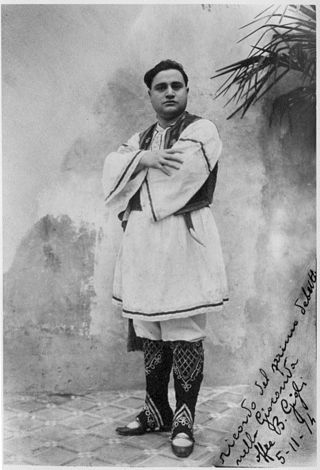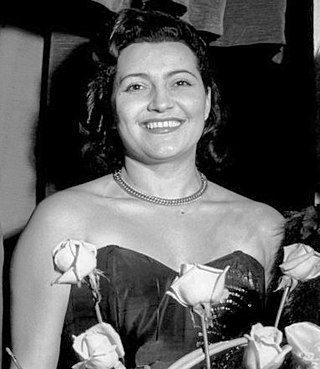Recordings
The performers of this song included Beniamino Gigli and Claudio Villa, [7] among many others.
"La spagnola" ("The Spanish Maiden", [1] "The Spanish Girl" [2] ), also known as "Stretti stretti, nell'estasi d'amor", [3] is a popular Italian song from the early 20th century. [4] [5] [6]
The song is dated to 1906 and was written by Neapolitan "tarantellist" Vincenzo Di Chiara. [4] [5] [6]
According to the official journal of the National Association of Teachers of Singing, the song is about "a Spanish beauty who believes in her powers of love". [6]
The performers of this song included Beniamino Gigli and Claudio Villa, [7] among many others.

Beniamino Gigli was an Italian opera singer. He is widely regarded as one of the greatest tenors of his generation.

Erna Berger was a German lyric coloratura soprano. She was best known for roles such as Queen of the Night and Konstanze.

Adionilla Pizzi, known by her stage name Nilla Pizzi, was an Italian singer and actress.
"Mamma" is a popular song composed in 1940 by Cesare Andrea Bixio with Italian lyrics by Bixio Cherubini under the title "Mamma son tanto felice".
Canzone napoletana, sometimes referred to as Neapolitan song, is a generic term for a traditional form of music sung in the Neapolitan language, ordinarily for the male voice singing solo, although well represented by female soloists as well, and expressed in familiar genres such as the love song and serenade. Many of the songs are about the nostalgic longing for Naples as it once was. The genre consists of a large body of composed popular music—such songs as "'O sole mio"; "Torna a Surriento"; "Funiculì, Funiculà"; "Santa Lucia" and others.
"Che gelida manina" is a tenor aria from the first act of Giacomo Puccini's opera, La bohème. The aria is sung by Rodolfo to Mimì when they first meet. In the aria he tells her of his life as a poet, and ends by asking her to tell him more about her life. It is one of the most recorded arias by tenors.
Wu Pak Chiu, was a prominent Chinese tenor who sang in Europe under the name of Gregorio Wu Pak Chiu.
James Melton, a popular singer in the 1920s and early 1930s, later began a career as an operatic singer when tenor voices went out of style in popular music around 1932–35. His singing talent was similar to that of his contemporary Richard Crooks and baritones John Charles Thomas and Nelson Eddy, who sang popular music but also had operatic careers.

Antonietta Meneghel, better known by her stage name Toti Dal Monte, was a celebrated Italian operatic lyric soprano. She may be best remembered today for her performance as Cio-cio-san in Puccini's Madama Butterfly, having recorded this role complete in 1939 with Beniamino Gigli as Pinkerton.

Cesare Andrea Bixio was an Italian composer.

Arturo Buzzi-Peccia was an Italian singing instructor and song composer.

Martino Stanislao Luigi Gastaldon was an Italian composer, primarily of salon songs for solo voice and piano. However, he also composed instrumental music, two choral works, and four operas. Today, he is remembered almost exclusively for his 1881 song "Musica proibita", still one of the most popular pieces of music in Italy. Gastaldon also wrote the lyrics for some of his songs, including "Musica proibita", under the pseudonym Flick-Flock. He was born in Turin and after a peripatetic childhood studied music there and in Florence. By 1900, he had settled permanently in Florence, where he died at the age of 77. In his later years, he also worked as a voice teacher, music critic, and art dealer.
Spagnola is an Italian surname, meaning literally "Spanish", from and/or of "Spain" and may refer to:

Salvatore Fisichella is an Italian operatic tenor known for his roles in bel canto operas, especially those of Rossini, Donizetti and Bellini. He has been recognized for the ease and vocal brilliance of his singing, and for having sung more of the leading roles in Bellini's operas than any other 20th century tenor.
Rondine al nido is a romance and one of the best known works of the Italian composer Vincenzo de Crescenzo, whose music was in the repertoire of Beniamino Gigli, Tito Schipa, Giuseppe Di Stefano, Richard Tucker, Luciano Pavarotti, Luigi Infantino, Ramón Vargas, Robert Dean Smith, Francesco Albanese, among many others.

Red Moon is a 1951 Italian melodrama film directed by Armando Fizzarotti and starring Renato Baldini, Maria Frau and Leda Gloria. It takes its title from a popular song.
Giulietta Pezzi was an Italian writer and journalist whose work included poetry, four novels, and a five-act play. Born and educated in Milan, she was a devoted follower of Mazzini and active in the Italian republican and unification movements. In her later years she wrote for several newspapers and dedicated herself to the establishment of free public schools in Italy based on Mazzini's educational philosophy. She died in the city of her birth at the age of 71. During her lifetime several art songs were dedicated to her, including Bellini's "Vaga luna, che inargenti".
Vincenzo Di Chiara was an Italian amateur operatic baritone and composer of popular art songs. He made his mark with one song "La spagnola" which was a worldwide hit and was recorded by Rosa Ponselle.

Helena Arizmendi, sometimes featured as Elena Arizmendi, was an Argentine operatic soprano. A student of Maria Barrientos, she made her début in 1945 in Buenos Aires at the Teatro Colón where in 1948 she partnered Beniamino Gigli as Mimi in La Bohème. She was highly acclaimed for her performances in Italy which included La Scala. In 1989 she received the Konex Award.
"I' te vurria vasà" is a 1900 song composed by Vincenzo Russo, Eduardo Di Capua, and Alfredo Mazzucchi. A classic of the Canzone Napoletana, the song premiered at the Teatro Mercadante, performed by Amina Vargas.
Vincenzo Di Chiara's "La Spagnola" was a popular song in its day and tells of a Spanish beauty who believes in her powers of love.
![]() Media related to La spagnola at Wikimedia Commons
Media related to La spagnola at Wikimedia Commons